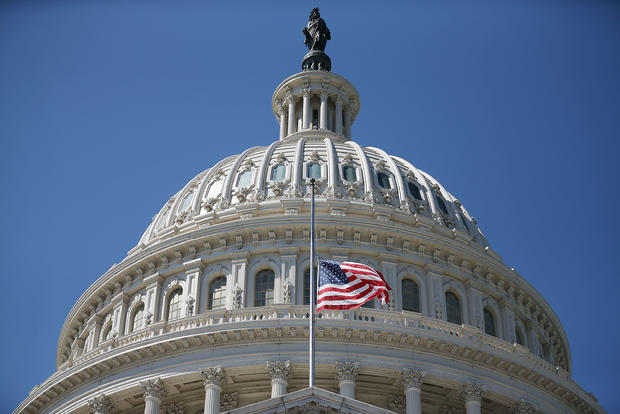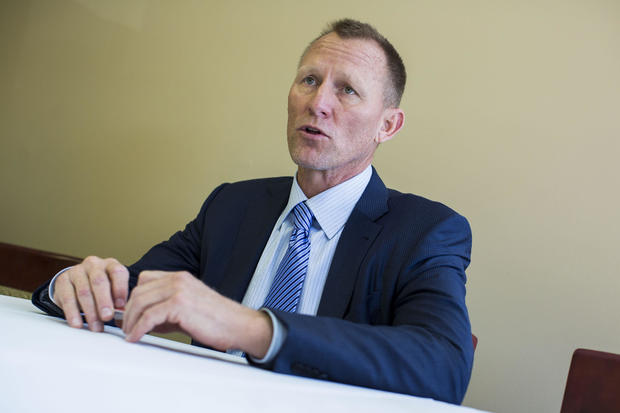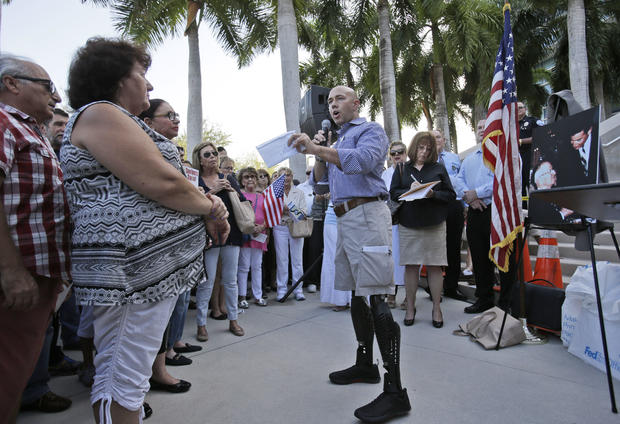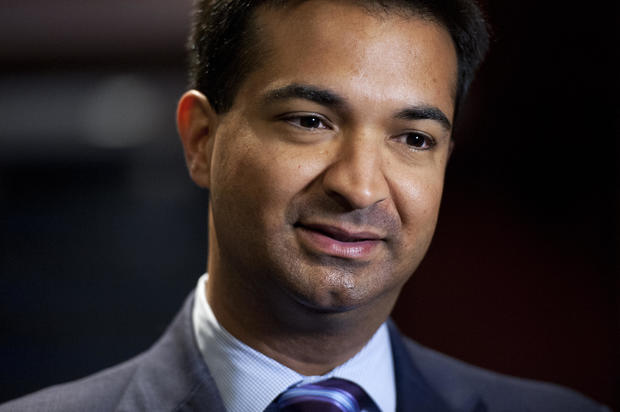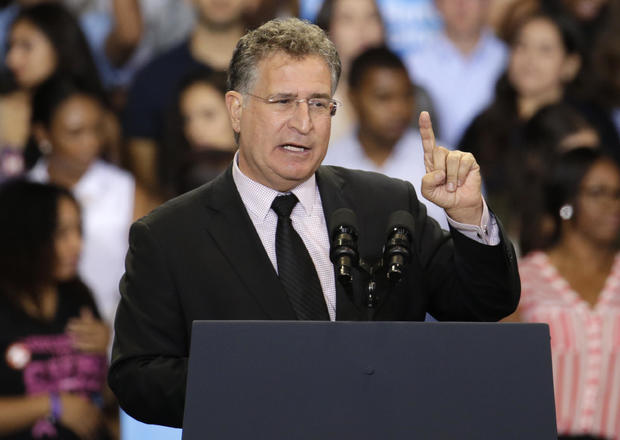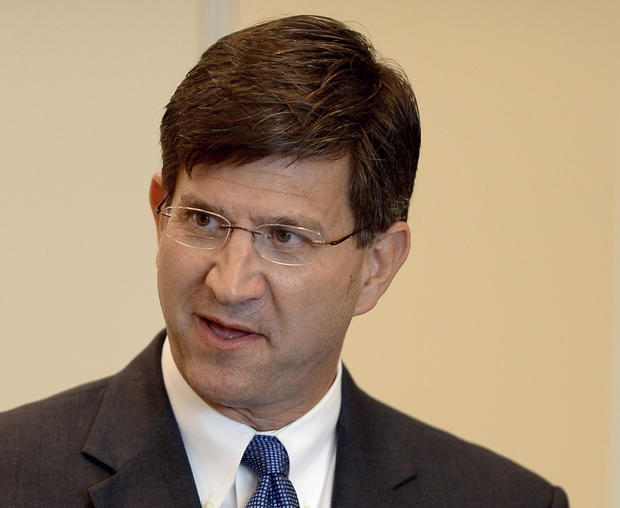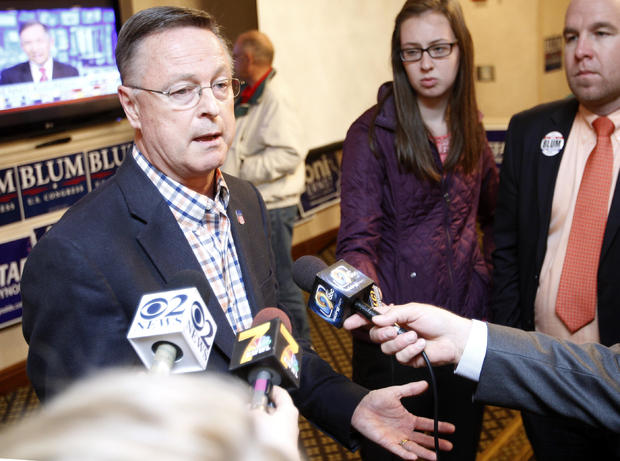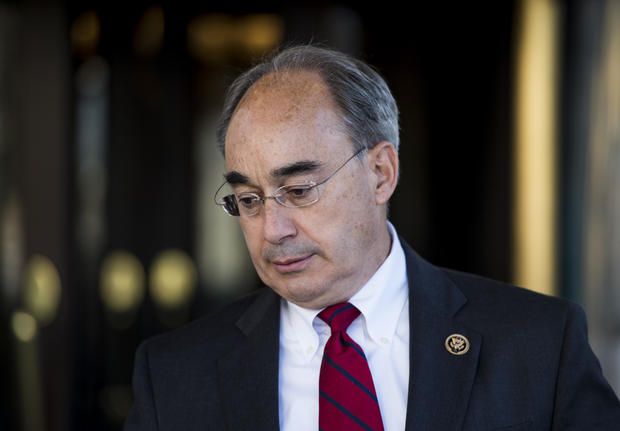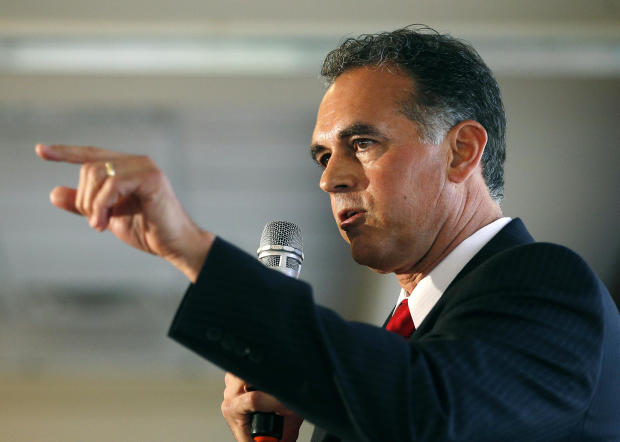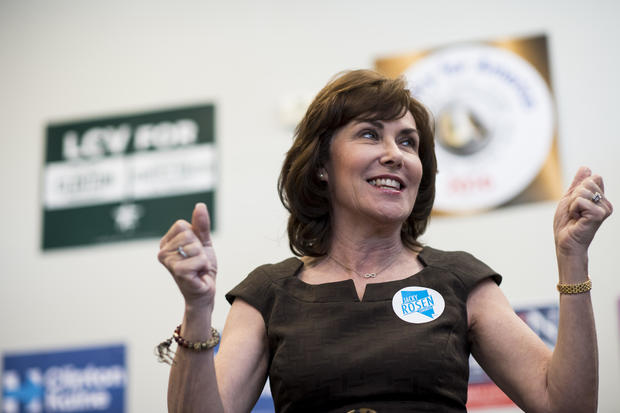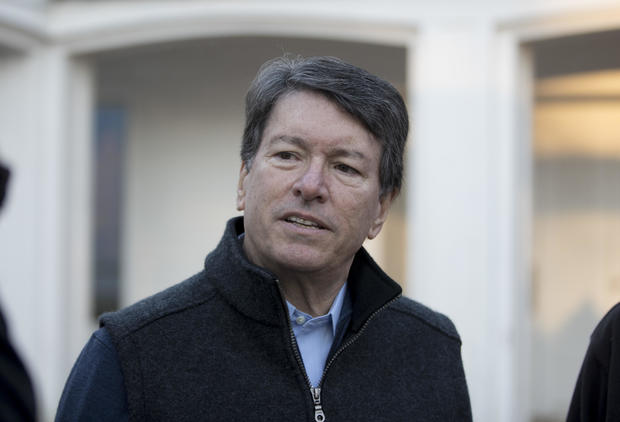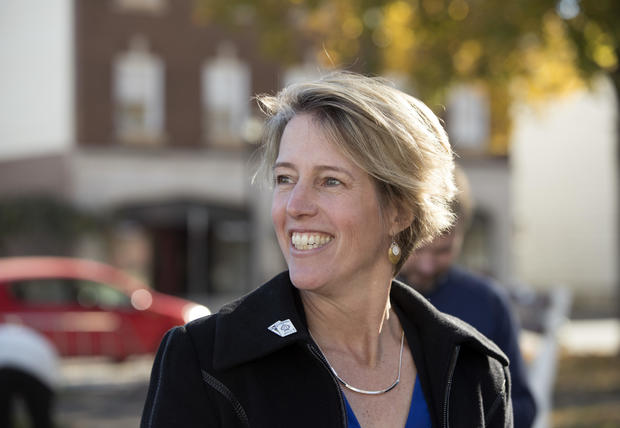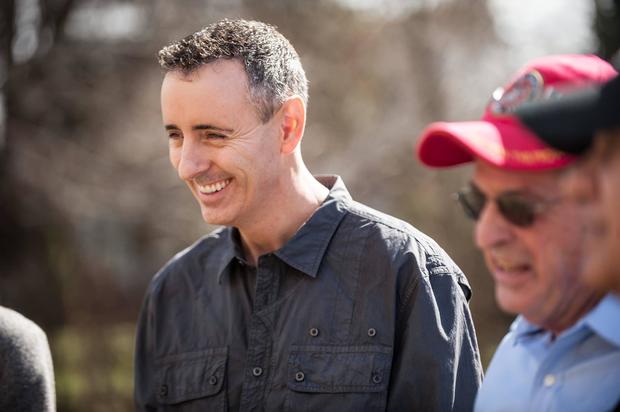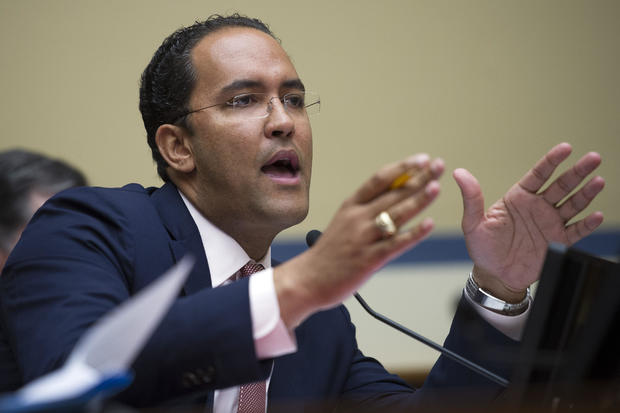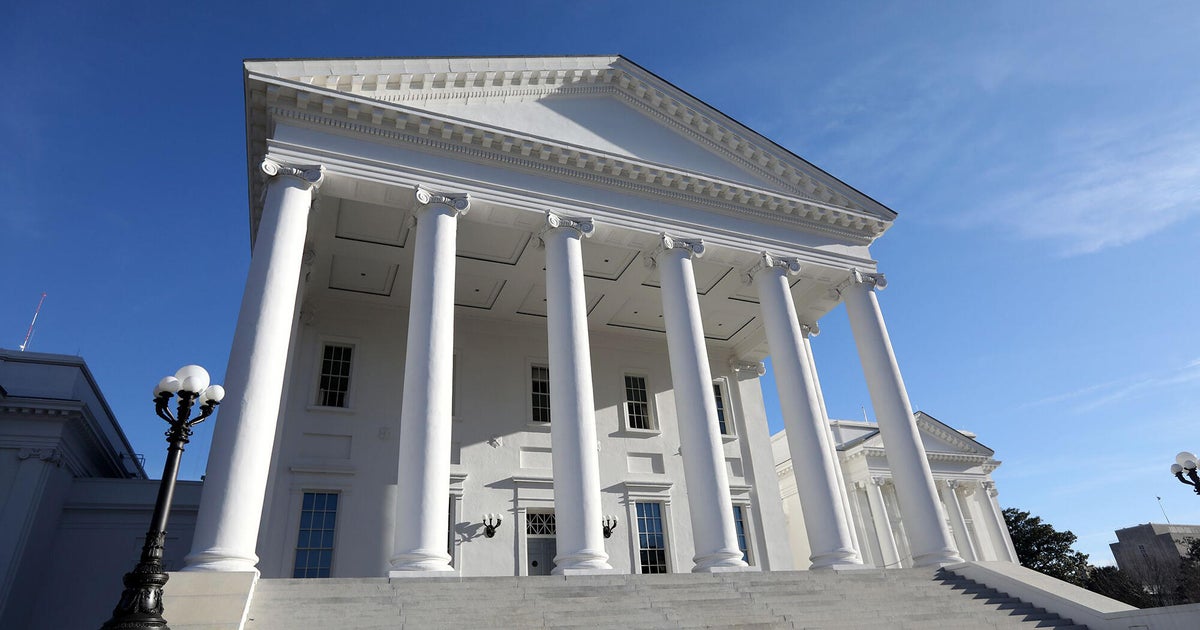The 2016 Battle for the House
The 2014 midterm elections handed the Republican party a majority in the House of Representatives not seen since the Great Depression. Chances of losing the House are slim, but not impossible-- particularly since it remains uncertain how Republican nominee Donald Trump will affect down-ballot races.
Among the 435 House seats, Republicans occupy 246, Democrats hold 186, and three are vacancies. This year, there are 30 Republican seats open and 19 Democratic ones. In order to steal back the majority and dethrone House Speaker Paul Ryan, Democrats must claim victory in 30 House races. That’s nearly 71 percent of all House races.
Representatives will be sworn in as members of the 115th Congress on January 3, 2017.
Here’s a guide to the top 10 battleground House races.
FLORIDA'S 18TH DISTRICT: Randy Perkins (D)
Incumbent Rep. Patrick Murphy chose not to seek reelection in the House upon launching his Senate bid against Sen. Marco Rubio--leaving Florida’s 18th congressional district seat open.
Democratic candidate Randy Perkins will face Republican nominee Brian Mast.
Perkins has been under frequent attack for his “unfit” temperament and questionable business records--characteristics reminiscent of Republican nominee Donald Trump. Perkins most recently inundated headlines when he said that his Republican opponent Brian Mast, an Army veteran who lost his legs in Afghanistan after an IED detonated, wasn’t “man enough to stand behind [his] own ads.”
FLORIDA'S 18TH DISTRICT: Brian Mast (R)
Mast spent more than a decade in the Army and served under the Joint Special Operations Command (JSOC) as a bomb disposal responsible for detecting and destroying IEDs. The last IED he found resulted in the loss of both his legs. He was subsequently awarded The Bronze Star Medal,The Army Commendation Medal for Valor, The Purple Heart Medal, and The Defense Meritorious Service Medal.
A central issue of Mast’s campaign is Lake Okeechobee. Because an unusually wet winter has caused the lake to reach dangerous water levels, officials have attempted to remedy the problem by dumping some of the water into the nearby Everglades--leading to a host of environmental problems.
Mast supports a plan to buy 60,000 acres south of the lake to construct a reservoir to hold the polluted Lake Okeechobee water.
FLORIDA'S 26TH DISTRICT: Incumbent Carlos Curbelo (R)
The 26th District now encompass Monroe Country and a portion of Miami-Dade County in the southern tip of Florida, including the Florida keys.
Incumbent Carlos Curbelo and former Rep. Joe Garcia have a history. Before the majority-Hispanic district was drawn to include a voter base that leans left, Curbelo ousted Garcia from the seat in 2014 in a close race.
FLORIDA'S 26TH DISTRICT: Joe Garcia (D)
The two campaigns have engaged in rhetoric strikingly similar to that seen at the presidential level. Political controversy swarmed Garcia after a secretly recorded tape revealed that the former Democratic representative characterized Hillary Clinton as “sexually unappealing.” The tape preceded the now infamous Access Hollywood recording that showed Trump describing women in lewd terms.
ILLINOIS' 10TH DISTRICT: Incumbent Bob Dold (R)
Comprising much of Chicago’s wealthy North Shore, Illinois’ 10th district features Republican incumbent Bob Dold and former Rep. Brad Schneider. The two candidates have challenged each other since 2010 when Dold rode the Tea Party wave to election victory. Schneider narrowly beat Dold in 2012, and in 2014--a brutal midterm for down-ballot Democrats--Dold stole the title once again.
Dold’s quick denunciation of the top of the Republican ticket isn’t enough to disrupt the political pattern seen in the district’s recent years. Schneider has close ties to Chicago natives Hillary Clinton and President Barack Obama as well as Massachusetts Sen. Elizabeth Warren, whom he featured in a TV ad.
ILLINOIS' 10TH DISTRICT: Brad Schneider (D)
Both candidates describe themselves as moderates willing to engage in bipartisan leadership. They say they support abortion rights and common-sense gun legislation, but oppose Iran Nuclear Deal signed under the Obama administration.
IOWA'S 1ST DISTRICT: Incumbent Rod Blum (R)
Iowa’s 1st district encompasses a whopping 20 northeast countries, stretching from Cedar Rapids to Waterloo and Marshalltown. According to the Des Moines Register, Democratic voters outnumber Republicans by about four points, though, the largest demographic of voters (38 percent) are those with no political affiliation.
Rep. Rod Blum is defending his seat from Democratic candidate Monica Vernon. Losing the 2012 GOP primary, Blum rose to power in 2014 after defeating former Iowa House Speaker Pat Murphy.
IOWA'S 1ST DISTRICT: Monica Vernon (D)
Vernon, who switched from Republican to Democratic in 2009, is hoping to break her losing spell. Following the launch of two unsuccessful congressional and lieutenant governor campaigns, Vernon decided to devout two years campaigning for this congressional seat.
Both candidates maintain political stances that echo the traditional ideologies of their party. Blum favors repealing the Affordable Care Act and eliminating the U.S. Department of Education. Vernon favors issues like expanding minimum wage and improving Obamacare.
MAINE'S 2ND DISTRICT: Incumbent Bruce Poliquin (R)
Maine, along with Nebraska, is an oddball state that allocates two Electoral College votes to the popular vote winner and then one to the popular vote winner in each congressional district--giving candidates running in Maine’s 2nd congressional election all the more reason to win.
MAINE'S 2ND DISTRICT: Emily Cain (D)
Democrat Emily Cain is challenging incumbent Republican Rep. Bruce Poliquin to a rematch after losing the 2014 race. Record-breaking fundraising numbers display just how close this race is. A local NBC affiliate pegged total campaign spending at $11 million.
Maine’s hotly-contested 2nd district has spewed into the presidential race. Republican nominee Donald Trump held a rally there at the end of October--his fifth visit to the state overall.
NEVADA’S 3RD DISTRICT: Incumbent Danny Tarkanian (R)
There’s an open House seat in Nevada’s 3rd congressional district, an area south of Las Vegas. Republican Danny Tarkanian and Democrat Jacky Rosen are looking to win a seat left vacant by Republican Joe Heck who chose to run for the Senate.
Though the district voted twice for President Barack Obama in 2008 and 2012, it’s been a Republican who has won the seat in six of the seen past elections. A local Nevada newspaper reported that 38 percent of active reporters are registered Democrats while 36 percent are Republicans.
Tarkanian may have name recognition to his advantage--he’s the son of legendary American basketball coach Jerry Tarkanian--but lost two bids for the Senate, Secretary of State, and Nevada’s 4th district. This is is fifth run for public office in Nevada since 2004. He opposes amnesty for immigrants and champions a more secure U.S. Mexican border.
NEVADA'S 3RD DISTRICT: Jacky Rosen (D)
Rosen, however, is a political newcomer, but has the endorsement of Sen. Harry Reid--an influential Democrat who opted to retire after spending nearly three decades in public office. She supports immigration reform that provides immigrants with a path to citizenship, opposes the Keystone pipeline and calls for clean energy independence.
NEW YORK'S 19TH DISTRICT: John Faso (R)
An area that spans the Hudson Valley and Catskill region is another race Democrats are hoping to win to recapture congressional majority. The seat is open after Republican Rep. Chris Gibson opted out of reelection, leaving Republican John Faso and Democrat Zephyr Teachout to battle it out.
Like many other Republicans in contentious races, Faso, who describes himself as a “center-right conservative,” has distanced himself from the top of the Republican ticket. He previously served as the minority leader of the State Assembly and maintains traditional Republican stances like overhauling Obamacare and opposing the use of tax dollars for abortions.
NEW YORK'S 19TH DISTRICT: Zephyr Teachout (D)
Democratic rival Teachout is a law professor who gained the endorsement of Vermont Sen. Bernie Sanders, but has said she will vote for Mrs. Clinton. The last poll was conducted at the end of September and showed the candidates in a virtual tie.
NEW YORK’S 22ND DISTRICT: Kim Myers (D)
There’s an open seat in New York’s 22nd district following the departure of Republican Rep. Richard Hanna--making it a crowded race for Democrat Kim Myers, Republican Claudia Tenney and Independent Martin Babinec. A recent Time Warner Cable News/Siena College poll found Tenney in the lead with 38 percent of the vote, followed by Myers at 34 percent, and Babinec in third with 16 percent of likely voters.
Myers currently serves in the Broome County Legislature and is the heiress to the Dick’s Sporting Goods fortune. She advocates for increased government regulation of the Environmental Protection Agency as well as the Internet.
NEW YORK’S 22ND DISTRICT: Claudia Tenney (R)
Unlike her fellow party members, Tenney said she will vote for Mr. Trump. She has not defended his brash actions or controversial comments, but argues that he’s preferable to Hillary Clinton. She’s also small business owner and current New York State Assemblywoman who champions tax cuts and gun rights.
NEW YORK'S 22ND DISTRICT: Martin Babinec (I)
The battle for New York’s 22nd district has evolved into one of the country’s most expensive House races. Third-party candidate Babinec alone has invested nearly $2.2 million of his own money into his campaign.
PENNSYLVANIA’S 8TH DISTRICT: Brian Fitzpatrick (R)
Suburban Philadelphia is a top target for Democrats who are hoping to flip the House because the district is mostly made up of middle-class and ideologically moderate voters. But that made not be enough for Democratic candidate Steve Santarsiero who’s facing Republican Brian Fitzpatrick--the brother of the incumbent congressman.
Fitzpatrick may have familial ties to the House seat, but the Republican candidate doesn’t have public office experience. He does, however, wear many hats--he’s a CPA and attorney and a former FBI agent who’s been deployed to Ukraine, Afghanistan and Iraq. Fitzpatrick has maintained his distance from GOP nominee Donald Trump, but embraces similar stances on national security and opposing the Trans-Pacific Partnership. Fitzpatrick also has said he would support “every measure possible” to curb climate change--something Trump has described as a “hoax.”
PENNSYLVANIA’S 8TH DISTRICT: Steve Santarsiero (D)
President Obama recently endorsed Santarsiero to represent Bucks County and portions of Montgomery County, describing him as “tough and smart” and a “common sense leader.” He also has experience, having won the state house seat in 2008 and 2010 in competitive races.
TEXAS’ 23RD DISTRICT: Pete Gallego (D)
Former Democratic Rep. Pete Gallego is vying to retake the seat he lost to incumbent Rep. Will Hurd in 2014. Comprised of a large Hispanic population, the outcome of Texas’ 23rd congressional district could be the deciding factor in this area, which shares more than an 800-mile border with Mexico. District 23 voted Democrat in 2008 and 2012, and Republican in 2014. The hotly contested race has caused both parties to spend nearly $12 million.
Gallego is a former prosecutor-turned-politician who advocates for increasing the minimum wage and reforming Obamacare. He touts his bipartisan record, pointing to an independent site that ranked him as “the most bipartisan House freshman in 2013.”
TEXAS’ 23RD DISTRICT: Incumbent Will Hurd (R)
After spending nearly a decade recruiting spies as a former CIA agent, Hurd chose to enter the political scene after experiencing Washington dysfunction firsthand. He launched an unsuccessful campaign in 2010, but, in 2014, he narrowly beat out then-Congressman Gallego by just two percentage points, or fewer than 2,500 votes, according to Real Clear Politics. Following the release of a 2005 video showing the GOP nominee describing women in lewd terms, Hurd called on Trump to exit the presidential race in favor of a “true conservative.”
